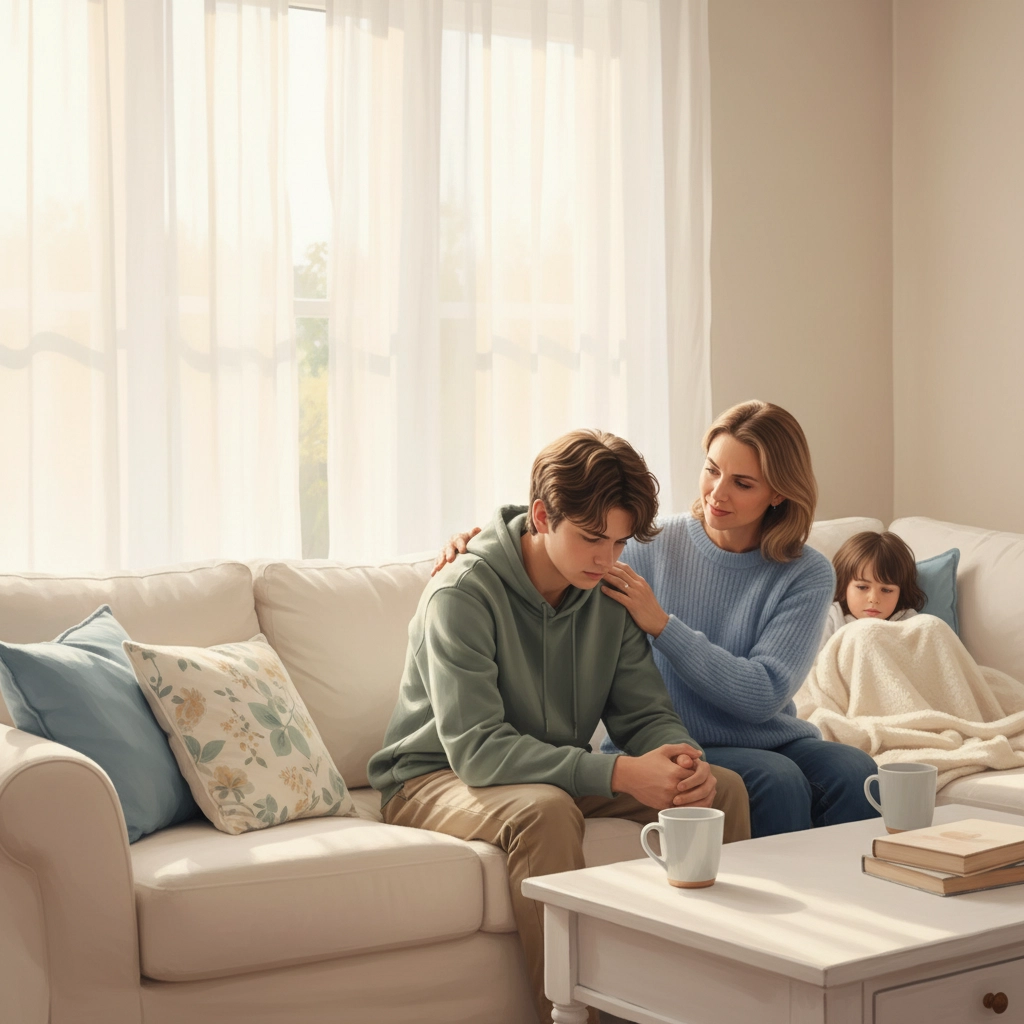Watching someone you love struggle with anxiety can feel heartbreaking, especially when they refuse to seek help. You might find yourself walking on eggshells, constantly adjusting your behavior to prevent their anxiety from spiraling, or feeling helpless as you watch them miss out on life's beautiful moments. If this sounds familiar, please know that you're not alone, and more importantly, there are still meaningful ways you can help, even when they won't step foot in a therapist's office.
At Lotus Psychology Practice, we understand this delicate situation all too well. That's why we're passionate about the SPACE program (Supportive Parenting for Anxious Childhood Emotions), an evidence-based approach that empowers family members to create positive change without requiring the anxious person to participate in treatment directly.
Understanding Accommodation: The Hidden Cycle
Before we dive into solutions, let's talk about something that might surprise you: accommodation. In the context of anxiety, accommodation refers to the changes we make in our behavior or environment to help our loved one avoid or reduce their anxiety in the moment. While these actions come from a place of love and compassion, they can actually strengthen anxiety over time.

Think of accommodation as accidentally feeding anxiety instead of starving it. When we consistently help someone avoid their fears, we're sending an unintended message that their anxiety is justified and that they're incapable of handling difficult situations on their own.
Let's look at some age-appropriate examples:
For young children (ages 5-10): Sarah's 7-year-old son refuses to sleep in his own bed because he's terrified of monsters. Every night, mom sleeps in his room or brings him into her bed. While this eliminates the immediate distress, it reinforces the belief that his bedroom truly isn't safe.
For tweens and teens (ages 11-17): Marcus, age 14, has social anxiety and begs his mom to call in sick for him whenever there's a presentation at school. His mother, seeing his genuine distress, makes the calls. Though well-intentioned, this prevents Marcus from learning that he can cope with anxiety-provoking situations.
For young adults (ages 18+): Emma, 22, has panic attacks when driving on highways. Her parents have started doing all her errands and driving her everywhere. While this reduces her immediate anxiety, it also shrinks her world and reinforces her belief that highways are truly dangerous.
The SPACE Program: A Different Path Forward
Here's where the SPACE program offers hope. Instead of focusing on changing your loved one directly, SPACE teaches family members how to respond differently to anxiety. It's like learning a new dance, when you change your steps, your partner naturally begins to move differently too.
The beauty of SPACE lies in its recognition that family members are incredibly influential in the anxiety cycle, even when the anxious person won't participate in treatment. By making thoughtful changes in how you respond, you can help break the accommodation pattern and encourage your loved one to develop their own coping skills.

The Three Pillars of SPACE
1. Reducing Accommodations Gradually
This doesn't mean throwing your loved one into the deep end. Instead, SPACE teaches you to reduce accommodations slowly and compassionately. You might start by saying, "I know this feels scary for you, and I love you. I'm going to support you in a different way now because I believe you can handle this."
For our earlier examples, this might look like:
- Sarah gradually transitions from sleeping in her son's room to sitting by his door, then checking on him periodically, then letting him practice being brave in his own space
- Marcus's mom might say, "I know presentations feel overwhelming. Let's practice what you'll say if you feel anxious, and I'll be thinking of you during your presentation"
- Emma's parents might start with short errands, saying, "We believe in your ability to handle this. We'll be here when you get back"
2. Validating Emotions While Encouraging Growth
The SPACE program teaches a crucial balance: you can acknowledge your loved one's feelings without necessarily changing your behavior to eliminate their discomfort. This sounds like:
"I can see you're really worried about this, and that makes sense. Anxiety can feel overwhelming. I'm going to support you by believing in your strength to get through this."
3. Building Your Own Supportive Community
Caring for someone with anxiety can be exhausting. The SPACE program emphasizes that you need support too. This might involve connecting with other family members going through similar experiences, working with a therapist yourself, or simply practicing self-compassion when you feel frustrated or helpless.
Practical Strategies You Can Start Today
Create a Supportive Climate
Instead of trying to eliminate all sources of anxiety from your loved one's life, focus on creating an environment where they feel safe to experience and work through difficult emotions. This means staying calm when they're anxious, avoiding excessive reassurance-seeking, and expressing confidence in their ability to cope.
Use Supportive Language
Replace phrases like "Don't worry" or "Just calm down" with:
- "This seems really hard for you right now"
- "I'm here with you, and we'll get through this together"
- "I believe in your ability to handle difficult feelings"
Set Loving Boundaries
Boundaries aren't walls, they're bridges that help create healthier relationships. You might say, "I love you, and I won't be able to call your boss for you. Let's think together about what you might say if you need to talk to them."

When Progress Feels Slow
Remember, like a lotus flower that grows through muddy water to bloom beautifully on the surface, growth often happens in ways we can't immediately see. Your loved one might resist these changes initially, and their anxiety might even seem to increase temporarily. This is normal and doesn't mean you're doing anything wrong.
Maya Angelou once said, "There is no greater agony than bearing an untold story inside you." Sometimes, our accommodations prevent our loved ones from writing their own stories of resilience and growth. By stepping back lovingly, we give them space to discover their own strength.
Finding Professional Support
While you can't force someone into therapy, you can seek support for yourself. At Lotus Psychology Practice, we offer SPACE training for family members, helping you learn these skills in a supportive, non-judgmental environment. We understand that loving someone with anxiety requires its own kind of courage, and we're here to support you on this journey.
Working with a trained professional can help you navigate the complexities of reducing accommodations while maintaining a loving relationship. We can help you identify which accommodations to address first, how to handle resistance, and how to take care of your own emotional well-being throughout this process.
The Ripple Effect of Change
Here's something beautiful about the SPACE approach: when you change how you respond to anxiety, you often see positive changes not just in your anxious loved one, but in your entire family system. Siblings learn healthier ways to cope with stress, parents feel more confident and less overwhelmed, and everyone begins to see anxiety as something manageable rather than catastrophic.
You don't have to wait for your loved one to be ready for therapy to start creating positive change. Your love, expressed through thoughtful boundaries and supportive responses, can be incredibly healing and transformative.
Remember, you're not giving up on your loved one by refusing to accommodate their anxiety, you're actually showing the deepest form of love by believing in their capacity to grow, heal, and thrive. Every small step you take toward healthier responses is a seed of hope planted in your family's garden.
If you're ready to learn more about how the SPACE program can help your family, please don't hesitate to reach out to us at Lotus Psychology Practice. We're here to support you with compassion, expertise, and the unwavering belief that positive change is always possible.
